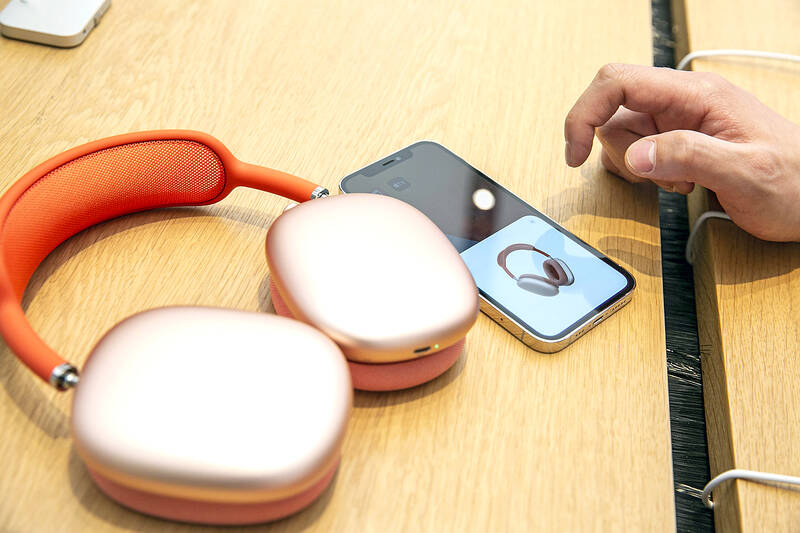Inspection fees for radio-frequency equipment are likely to be less than NT$750 or free if it can be confirmed that they are for personal use only, the National Communications Commission (NCC) said yesterday.
The proposed policy change would be discussed when the commission meets the mandated quorum of four to hold a meeting, the commission said. Currently, the seven-member commission has only three commissioners.
The commission made the statement after on Monday last week suspending the collection of the NT$750 equipment inspection fee due to complaints from consumers.

Photo: Bloomberg
Prior to the fee adjustment, only consumers bringing in three or more radio-frequency products from abroad would be asked to pay an equipment inspection fee of NT$600. Fees are waived for consumers bringing fewer devices, who are only required to upload to the NCC system product specifications and an affidavit declaring that the devices are for personal use only.
To avoid paying inspection fees, many online buying agents would only import two radio-frequency devices each time, which dramatically increased the workload of the NCC.
As such, the commission decided to raise the inspection fee to NT$750 to prevent exploitation of the loophole in the system, adding that the fee change applies to those importing two or fewer devices from abroad as well.
Last year, the commission began welcoming public input on the fee change, which was scheduled to take effect on Feb. 5.
“The fee adjustment was proposed to deter buying agents from exploiting the system, but we found that many consumers bought these products for personal use. As such, we would consider amending regulations. Inspection fees for those buying radio-frequency products for personal use should be waived or charged in a smaller amount. The decision would not be made until the commission meets the quorum to convene,” NCC Secretary-General Huang Wen-che (黃文哲) said.
The number of applications for radio-frequency equipment inspections rose to approximately 40,000 last year from 25,000 in 2023, NCC data showed.
Of the 40,000 cases, about 10,000 were related to the importation of sports cameras, wireless microphones and drones. They were followed by 8,000 pieces of camera and photography equipment, 6,000 Bluetooth and regular headsets, and 5,000 Meta virtual-reality headsets and glasses, the commission said.
The NCC said it had issued 366 payment slips since Feb. 5, with 322 people having paid. The remaining 44 have yet to pay the fee due to the suspension of the policy, it said.
The NCC would decide what to do with those who have paid the fees, Huang said.
He denied that the decision to roll back the measure was made because of political pressure.
The main purpose of the fee change is to ensure that buying agents follow the law, not to punish personal users, he said.
“We also have the responsibility to maintain the order of radio waves and protect user safety. People have problems with the way we carry out such missions, and we have to fix it,” he said, adding that the NCC might consider relaxing regulations for devices that would cause only minor interference, as well as better ways to identify personal users and buying agents.

The Ministry of Economic Affairs has fined Taobao NT$1.2 million (US$36,912) for advertisements that exceed its approved business scope, requiring the Chinese e-commerce platform to make corrections in the first half of this year or its license may be revoked. Lawmakers have called for stricter enforcement of Chinese e-commerce platforms and measures to prevent China from laundering its goods through Taiwan in response to US President Donald Trump’s heavy tariffs on China. The Legislative Yuan’s Finance Committee met today to discuss policies to prevent China from dumping goods in Taiwan, inviting government agencies to report. Democratic Progressive Party Legislator Kuo Kuo-wen (郭國文) said

The Ministry of Economic Affairs has fined Taobao NT$1.2 million (US$36,900) for advertisements that exceeded its approved business scope and ordered the Chinese e-commerce platform to make corrections in the first half of this year or its license would be revoked. Lawmakers have called for stricter supervision of Chinese e-commerce platforms and more stringent measures to prevent China from laundering its goods through Taiwan as US President Donald Trump’s administration cracks down on origin laundering. The legislature’s Finance Committee yesterday met to discuss policies to prevent China from dumping goods in Taiwan, inviting government agencies to report on the matter. Democratic Progressive Party

Taiwan and its Pacific ally Tuvalu on Tuesday signed two accords aimed at facilitating bilateral cooperation on labor affairs, according to Taiwan’s Ministry of Foreign Affairs (MOFA). The governments inked two agreements in Taipei, witnessed by Foreign Minister Lin Chia-lung (林佳龍) and visiting Deputy Tuvaluan Prime Minister Panapasi Nelesone, MOFA said in a news release. According to MOFA, the agreements will facilitate cooperation on labor issues and allow the two sides to mutually recognize seafarers’ certificates and related training. Taiwan would also continue to collaborate with Tuvalu across various fields to promote economic prosperity as well as the well-being of their

Sung Chien-liang (宋建樑), who led efforts to recall Democratic Progressive Party (DPP) Legislator Lee Kun-cheng (李坤城), was released on bail of NT$80,000 today amid outcry over his decision to wear a Nazi armband to questioning the night before. Sung arrived at the New Taipei District Prosecutors’ Office for questioning in a recall petition forgery case last night wearing a red armband bearing a swastika, carrying a copy of Adolf Hitler’s Mein Kampf and giving a Nazi salute. Sung left the building at 1:15am without the armband and covering the book with his coat. Lee said today that this is a serious